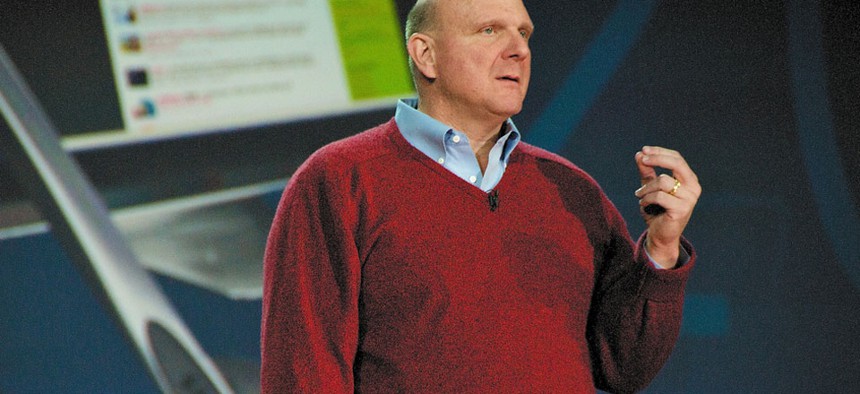Steve Ballmer’s Retirement Could Unlock the Talent and Resources Now Dormant at Microsoft

Flickr user jdlasica
Microsoft is still able to hire extremely talented people.
Here’s the thing you’d never know about Microsoft under the 13-year reign of Steve Ballmer: Microsoft remains, just barely, an amazing company. Not “amazing” in the sense of ambitious or unique, which it is, or particularly well-run, which it isn’t. But “amazing” in the one sense that counts at a technology company: Microsoft is able to hire, or simply acquire, extremely talented people.
Their intelligence and willingness to experiment is in evidence throughout Microsoft’s products. The interface of Windows 8 is a radical departure—so radical that it’s been wildly unpopular with desktop PC users, but had it been confined to mobile devices it might have been hailed as the one true alternative to the Apple/Google mobile duopoly. (It’s still doing well in Latin America, where it’s now more popular than Apple’s iOS.)
Microsoft’s Kinect motion sensor, originally built for gaming, is rapidly becoming one of the first truly useful alternatives to keyboards and mice for humans to interact with computers. And despite the abject failure of Microsoft’s Surface RT tablet, which happened because Microsoft saddled the device with a new operating system that can’t run traditional Windows programs, the Surface RT tablet is yet more evidence that Microsoft does actually make excellent hardware.
But Microsoft in its current state is a hard company to run. It’s less a corporation than it is a pile of vaguely related businesses, including gaming (Xbox, Kinect), software (Office, Windows), hardware, and web services (Bing, cloud versions of staples like Office). But that lack of focus is due in no small part to Ballmer, under whose leadership Microsoft has had a habit of acquiring companies, and then absorbing them badly. For example, Microsoft bought mobile startup Danger, but most of Danger’s senior employees soon left, alienated by the company culture. One of them, Andy Rubin, went on to create Android and run the Android division of Google.
Both outside the company and, say insiders I’ve spoken to, within it, Ballmer has always been viewed as more of a “bean-counter” than a technical genius like its founder, Bill Gates. Ballmer’s focus on sales sufficed to increase revenue in the years when Microsoft still enjoyed a near-monopoly on personal computing, through Windows.
(Image via Flickr user jdlasica)
NEXT STORY: All the Hurricanes of the Past 170 Years, Mapped





